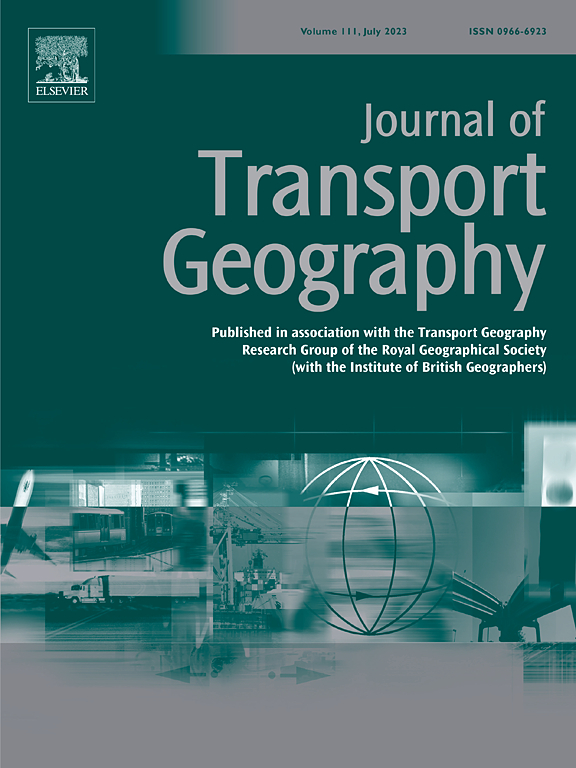伦敦与其他地区之间的跨地区铁路旅行和住房市场联系
IF 5.7
2区 工程技术
Q1 ECONOMICS
引用次数: 0
摘要
本研究以伦敦作为衡量英国住房市场涟漪效应的地点,旨在解释和验证区域间交通与住房市场区域相关性之间的高度相关性。根据有关短期流动与长期迁移之间关系的文献,本文说明了人们使用火车进行跨区域旅行的程度将与区域住房市场的涟漪效应相关。频繁的铁路运输行为,无论是通勤还是旅行,都可能增加人们在区域间迁移的意愿,从而导致跨区域房价和交易量的信息传递效应。首先,我们估算了涟漪效应的动态指标。然后,利用面板数据进行实证检验,包括跨时间(1996-2022 年)和跨地区(9 个地区)的波纹指标和乘客数量数据。结果发现,如果伦敦房价带动其他地区房价上涨,地区间运输需求就会增加,反过来,其他住房市场的房价上涨又会带动伦敦房价上涨。乘客数量会影响其他地区住房市场交易量向伦敦住房市场传递的信息。这意味着,区域间交通需求的增加可能会导致伦敦与其他房地产市场之间的迁移,使其交易量发生同向变化。本文的研究结果验证了区域间的旅行行为是影响区域房地产市场表现的领先/滞后行为的关键因素,这意味着短期旅行与长期迁移之间存在关系。结果还表明,纳入住房市场相关变量可能有助于预测旅客人数或运输需求。本文章由计算机程序翻译,如有差异,请以英文原文为准。
Inter-regional rail travel and housing markets connectedness between London and other regions
Taking London as a location with which to measure the ripple effect in the UK housing market, this study aims to explain and verify the high degree of correlation between inter-regional transportation and the regional correlation of the housing market. Based on the literature on the relationship between short-term mobility and long-term migration, this paper illustrates that the extent to which people use trains for travel across regions will be related to the ripple effect in the regional housing markets. Frequent railway transport behavior, whether for commuting or traveling, might increase people's desire to relocate between regions, and thus leading to information transmission effects across regional housing prices and transaction volume. First, we estimate a dynamic indicator for the ripple effect. Then, the empirical tests use panel data, including the ripple indicator and passenger number data across time (1996–2022) and regions (nine regions). It is found that if London house prices drive other regional house prices to rise, inter-regional transportation demand will increase, and in turn, the increase of house prices in other housing markets will again drive up London house prices. The number of passengers will affect the information transmitted by the housing market transaction volume in other regions to the London housing market. This implies that higher inter-regional transport needs may lead to migration between London and other property markets, causing their transaction volumes to change in the same direction. The results of this paper verify that travel behavior between regions is a crucial factor in the leading/lagging behavior of regional housing market performance, implying a relationship between short-term travel and long-term migration. The results also indicate that incorporating variables of housing market correlations may help in the prediction of passenger numbers or transportation demand.
求助全文
通过发布文献求助,成功后即可免费获取论文全文。
去求助
来源期刊

Journal of Transport Geography
Multiple-
CiteScore
11.50
自引率
11.50%
发文量
197
期刊介绍:
A major resurgence has occurred in transport geography in the wake of political and policy changes, huge transport infrastructure projects and responses to urban traffic congestion. The Journal of Transport Geography provides a central focus for developments in this rapidly expanding sub-discipline.
 求助内容:
求助内容: 应助结果提醒方式:
应助结果提醒方式:


